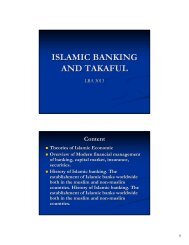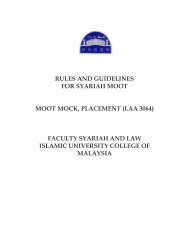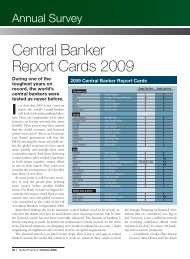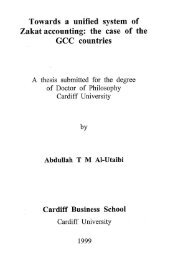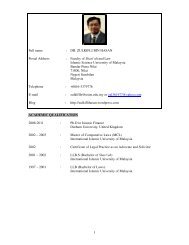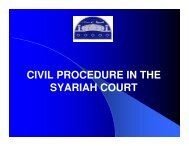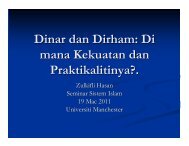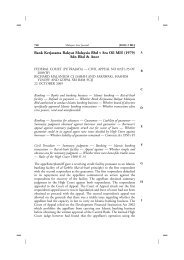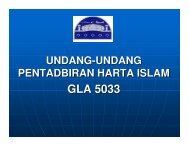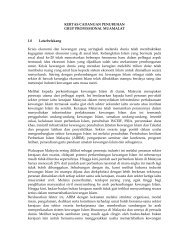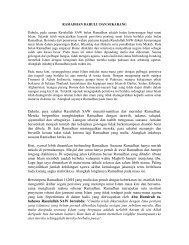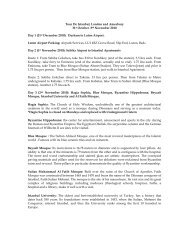Conceptual Framework of Zakat
Conceptual Framework of Zakat
Conceptual Framework of Zakat
You also want an ePaper? Increase the reach of your titles
YUMPU automatically turns print PDFs into web optimized ePapers that Google loves.
Islamic Law <strong>of</strong>PropertyLAB2033DR. ZULKIFLI HASAN
<strong>Zakat</strong> <strong>Zakat</strong> was practiced since Prophet Shuaib, , ProphetIsmail (al-maryammaryam: : 55) and other samawi religionsuch as Nasrani and Judaism. 2 nd Year <strong>of</strong> hijrah- Only to faqir and miskin 9 th Hijrah- Verse on 8 zakat recipients (al-taubahtaubah:60) Allah associated zakat with salat in 82 verses. Somesays 30 verses on zakat, , 27 associated with zakat andsolat, , 8 madena and 22 Mecca. “And Be steadfasts in prayer and give zakat”albaqarah 110.
<strong>Zakat</strong> in Hadith Sunna corroborates the Quran. Islam is raised on five pillars ie the oneness <strong>of</strong>Allah, the establishment <strong>of</strong> salat, , payment <strong>of</strong>zakat. . Fasting <strong>of</strong> ramadhan and the hajj.
Charity in Other Religion Hinduism- in term <strong>of</strong> gifs, donation, notobligatory Judaism- exist a priestly class. a1/10 revenue wasgiven to the priest Christianity- No precise law <strong>of</strong> charity Islam-Comprehensive law <strong>of</strong> charity
Meaning <strong>of</strong> zakat Purity To purify one’s s possession <strong>of</strong> wealth bydistributing a prescribed amount imposed on therich as an essential mode <strong>of</strong> ibadah. Sadaqa tatawu and sadaqa mafruda. <strong>Zakat</strong> signifies the obligatory contribution. There is no equivalent practice in other religions.
The Differences btn <strong>Zakat</strong> and Tax<strong>Zakat</strong>Religious dutyMuslimNever be waivedFixed RateTaxEconomic responsibilityAll citizensTax can be forgivenChangeable
<strong>Zakat</strong>Methods <strong>of</strong> distribution aredefiniteTaken from the rich to giveto the poorOut <strong>of</strong> productive wealthExemptions are organic andrealisticTaxNot definiteNot necessary soCan be taken out <strong>of</strong>consumption <strong>of</strong> expenditureExemptions are not flexiblebut accountable
<strong>Zakat</strong>Form <strong>of</strong> worshipDivinely grantedNo transfer <strong>of</strong> burdenWider base than taxation.Assets which are growingCheaperTaxEvasion is real possibilityNon-divine right to collectmoneyCan transfer the burden toconsumerScope is narrowHigher than zakat
The Importance <strong>of</strong> zakat Fourth pillar <strong>of</strong> Islam <strong>Zakat</strong> was made obligatory at Madena 2 nd hijrah. Imam ak-SarakhsiSarakhsi-<strong>Zakat</strong>equals one third <strong>of</strong> Islam. <strong>Zakat</strong> is associated with solat. . 82 places in al-quranquran. Caliph Abu Bakar declared war against those whodisassociated salat from zakat Equal distribution <strong>of</strong> economy.
Virtues and Benefit <strong>of</strong> <strong>Zakat</strong> Ibadah Equitable system <strong>of</strong> wealth distribution Social security Self-Refinement Social Role Saves Muslims from Misfortune Self Generating reformative system
Basis <strong>of</strong> Zakah 1. Productivity or growth (nama(nama) Assets held for personal and family use ,such ashousehold furniture and transportation are not subjectto zakat Assets that do not grow ,such as bad debts are also notsubject to zakat. All growing assets, according to the preponderant view<strong>of</strong> among jurists except with the Zahiriyyah are subjectto zakat . 2. Possession and full ownership
3. Nisab 2.5% from the capital income 10% or 5% from the land crops According to detailed code <strong>of</strong> rates for livestock 20% <strong>of</strong> the found treasures
4. Hawl 12 full lunar months should pass over the possession <strong>of</strong>zakat payable asset from the beginning <strong>of</strong> its ownership.But this condition applies to capital assets ,such asmoney ,business stock and livestock In the case <strong>of</strong> earned income, such as crops,fruits,minerals and found treasure ,including wages, salariespr<strong>of</strong>essional fees it is not a condition they are classifiedas earned assets (mal mustafad).
What to exempt? 1. Deduction <strong>of</strong> essential needs: basic needs oressential goods and services that one needs tosustain himself and his dependent 2. Deduction <strong>of</strong> debt
On Whom? 1. Reason and Maturity 2. The State <strong>of</strong> Being Muslim 3. Free person 4. Nisab 5. Wealth should be 1. fully owned 2. in excess <strong>of</strong> hispersonal needs. 3. one year 4. productive in naturewhich he can derive pr<strong>of</strong>it. Property which lacks <strong>of</strong> productivity and basicessentials <strong>of</strong> life are exempt from zakah
Conditions for Taxability <strong>of</strong> Wealth 1. Legitimate ownership 2. Lasting value 3. Tallying with taxable wealth and limits. 4. Possession <strong>of</strong> a year except in agriculture. 5. Freedom from debt 6. Freedom from loan 7. Freedom from larceny or accidental loss. 8. Free accessibility and free disposability
Kinds <strong>of</strong> wealth Gold and silver and cash Article or merchandise Agricultural products Livestock Mineral and treasures Salaries and Pr<strong>of</strong>essional Income
Silver, Gold and Cash As long as the amount constitutes a nisab. Gold- 20 Mithqal or 85 grams Silver- 200 dirhams or 595 grams Rate <strong>of</strong> zakat 2.5% <strong>of</strong> the value. Cash, Shares and Bonds equal value <strong>of</strong> gold orsilver In Malaysia- RM6200.00
<strong>Zakat</strong> On Debt If debt is acknowledged by the debtor with thewillingness to pay it <strong>of</strong>f, the creditor should payhis zakat and vice versa.
<strong>Zakat</strong> on Jewellery Only gold and silver jewellery. Jumhur- if keep her jewellery as a treasure. Abu Hanifa- Must constitute nisab
<strong>Zakat</strong> Upon Articles <strong>of</strong> Merchandise Obligatory. Goods, estates, clothing, cars, buildings, fruitsand etc. Nisab- same as cash. Hawl- one lunar year Intention <strong>of</strong> trade at the time <strong>of</strong> possession.
<strong>Zakat</strong> on Agriculture Rate: if the land is irrigated by artificial methods 1/20. If the land irrigated by rivers- 1/10 Nisab: : five wasaqs-651.4 KG for dates and 675 forgrains. Types Subject to zakat:- Wheat, barley, dates andraisins-Obligatory. Jumhur- All types <strong>of</strong> agriculture yield which can bestored or regular food. It becomes due when the grains are matured and thefruits are ripened.
<strong>Zakat</strong> on Honey and Animal Including products based on honey and animal. Nisab- Five wasaqs Rate- 1/10 after covering expenses.
Zakah on Livestock Camels, cows, bulls, buffalos, sheep and goats. Nisab- 5 camels, 40 sheep, 30 cows Hawl: : One lunar year.
<strong>Zakat</strong> on Minerals and Treasures Nisab- 2.5% <strong>of</strong> value as cash Rikaz- 1/5 <strong>of</strong> the value. Hawl- Do not require completion <strong>of</strong> a year.
<strong>Zakat</strong> on Income Obligatory 2.5% from the total yearly income deductingpersonal expenses
<strong>Zakat</strong> in Malaysiazakat on savings is levied at the rate <strong>of</strong> 2.5% on the lowestbalance <strong>of</strong> a person’s s saving for the year,zakat on income is 2.5% <strong>of</strong> a person’s zakatable incomezakat on business is 2.5% <strong>of</strong> the zakatable assets <strong>of</strong> thebusiness,zakat on shares is levied at 2.5% on the lowest value <strong>of</strong> theyear <strong>of</strong> shares owned by the payer after deducting debts orloans on the shares,zakat on gold is 2.5% on the value <strong>of</strong> gold kept by a personfor each year (if not less than nisab <strong>of</strong> 85 grams),zakat on corps or rice is is 10% <strong>of</strong> the field value <strong>of</strong> the riceharvested if this is more than 1,620 kgzakat fitrah is about RM4.00 to RM5.00 per head
Year20072006200520042003200220012000199919981994-1997Nisab (RM)6,2004,6004,2003,7003,0003,0002,9003,2002,9002,8002,700
Asnaf 1. Fakir is Muslim who does not possess anypermissible and qualified self-gained wealth (job) or hasan income which represents lower than 50% from hisdaily basic need and his family based on a moderate lifestyle. 2. A ‘Miskin’ or needy is a Muslim who possesses somewealth, permissible and qualified work which representsmore than 50% <strong>of</strong> his basic need and his family butinsufficient and does not meet Haddul Kifayah. These two categories include the poor from orphans,widows, elderly, ill, and others who do not have asponsor, low-income workers, families <strong>of</strong> lostindividuals, and the unemployed.
Cont… 3. Muslim Converts (Muallaf(Muallaf) ) Recent embracers <strong>of</strong>Islam Those who his heart being tamed or tends to acceptIslam or a person who just embraced Islam that is ‘totame his or her heart’ through assistance to strengthentheir love towards Islam. Debtors (Gharimin(Gharimin) A Muslim who makes loans to fulfill his basic needsand his family members or a person who make loans tosolve his community’s s problems and needs. (Debtor isunable to settle his debts and the debt is for matters <strong>of</strong>good and permissible by the Islamic laws).
Cont.. For The Cause Of Allah (Fi(Sabilillah) Fi Sabilillah is any action / happening that leads to the needs andproblems to upright the Islamic teaching. Therefore any acts,which strive in the cause <strong>of</strong> Allah to ensure that injustice againstMuslim is stopped and upright Islamic teaching, are consideredas Fi Sabilillah. Wayfarer (Ibnu(Sabil) ) Stranded Travelers A Muslim who runs out <strong>of</strong> provision while on a journey or aperson who wants to begin his journey but posses no provisionon conditions (He begins his journey from his own hometown,The purpose <strong>of</strong> the journey is for a good cause permissible bythe Islamic law). This would include people facing religious or racial persecution,political exiles or refugees, those seeking safety from oppressiononand those pursuing knowledge and education or involved insatisfying meritorious social wants away from home.
Cont..Riqab (liberating slaves)Even though there is no more slavery systemin this contemporary world, the portion <strong>of</strong>Riqab is payable in terms <strong>of</strong>: Akidahrehabilitation aid and Akhlak rehabilitationaid
AmilThe collectors to collect the , )) المصدقون<strong>Zakat</strong> dues and deposit them in theauthorized <strong>Zakat</strong>-centrescentres.The distributors )),, to apportion the القسامون<strong>Zakat</strong> funds.The custodians )),, to keep safe and disburse the الحافظون<strong>Zakat</strong> funds to thelawful beneficiaries.The custodians include : the treasurers – the caretakers <strong>of</strong> the <strong>Zakat</strong> granariesand <strong>Zakat</strong> storehouses.The measures )),, to measure or weigh the cereals and other kinds <strong>of</strong> الكيالونagricultural produce levied as <strong>Zakat</strong>.The scribes or clerks to keep the , )) الكاتبون<strong>Zakat</strong> files and records.The accountants )),, to keep account <strong>of</strong> the الحاسبون<strong>Zakat</strong> revenue andexpenditure.The informers to seek out those persons who are deserving <strong>of</strong> , )) العارفونreceiving <strong>Zakat</strong> assistance and to inform the <strong>Zakat</strong>-<strong>of</strong>ficials <strong>of</strong> their conditionand whereabouts.The assemblers )),, to assemble the الحاشرون<strong>Zakat</strong>-payers or the beneficiaries<strong>of</strong> <strong>Zakat</strong>, , when required.The <strong>of</strong>ficers in charge to direct and manage the various , )) رؤساء العاملين<strong>Zakat</strong>-centres and responsible to the state and to the public for the proper functioning f<strong>of</strong> their respective centres.رؤساء العاملينالمصدقونالقسامونالحافظونالكيالونالكاتبونالحاسبونالعارفونالحاشرون
Issue on Time <strong>Zakat</strong> must be paid immediately at its due time. Deferment is prohibited unless has valid reason. Permissible to pay zakat in advance- Jumhur
Issue on Transfer <strong>of</strong> <strong>Zakat</strong> Consensus: zakat can be transferred from onecity or country to another provided that theneeds <strong>of</strong> the city or country have been satisfied.
Issues on zakat owed by a deceasedperson If one dies before he pays zakat, , it must be paidfrom his estate.
Issue on the payment <strong>of</strong> the value At first majority <strong>of</strong> the scholars- not permissibleto pay the value instead <strong>of</strong> item itself. Abu Hanifah, Ibnu Qudama, Ibnu Taimiya-approved paying the value. Must choose the way which suffice the needs <strong>of</strong>the needy and more beneficial.
Issue on Investment <strong>of</strong> zakat fund First view- Qureshi, Taqi Usmani- the zakat collection must be disbursedimmediately The state has no locus standi to invest it with theview <strong>of</strong> generating more income.
Cont… Second View: Qaradhawi and Zarqa: : Allowable Jumhur: : ruler can spend the entire zakat fund for thebenefit <strong>of</strong> one class and also at different rate.Permissible based on maslahah. It is not against principle <strong>of</strong> tamlik- feasting andclothing <strong>of</strong> the poor are allowable Disbursement does not have to be prompt. Can begiven monthly basis The risk on investment could be avoided by properplanning- Hanafis and Shafiis in agreement thatproviding poor with tools for labor from zakat fundproves that zakat can be used for future security. It is not an innovation <strong>of</strong> denounced types as it benefitthe recipients.



